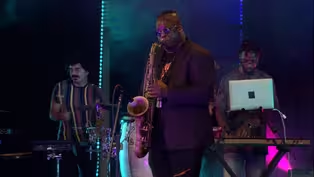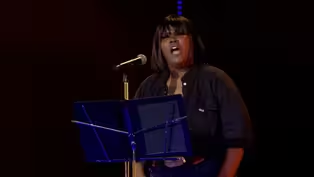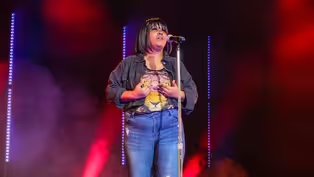
Curated by: WDET's Ryan Patrick Hooper
Season 12 Episode 2 | 26m 45sVideo has Closed Captions
Ryan Patrick Hooper turns his radio show “Culture Shift” into a live performance.
Ryan Patrick Hooper turns his radio show “Culture Shift” into a live performance on the Marygrove stage as poet Jassmine Parks grips the audience with her passionate and moving words. Then De’Sean Jones and that famous saxophone of his leads the Urban Art Orchestra in a celebration of music.
Problems playing video? | Closed Captioning Feedback
Problems playing video? | Closed Captioning Feedback
Detroit Performs is a local public television program presented by Detroit PBS

Curated by: WDET's Ryan Patrick Hooper
Season 12 Episode 2 | 26m 45sVideo has Closed Captions
Ryan Patrick Hooper turns his radio show “Culture Shift” into a live performance on the Marygrove stage as poet Jassmine Parks grips the audience with her passionate and moving words. Then De’Sean Jones and that famous saxophone of his leads the Urban Art Orchestra in a celebration of music.
Problems playing video? | Closed Captioning Feedback
How to Watch Detroit Performs
Detroit Performs is available to stream on pbs.org and the free PBS App, available on iPhone, Apple TV, Android TV, Android smartphones, Amazon Fire TV, Amazon Fire Tablet, Roku, Samsung Smart TV, and Vizio.
Providing Support for PBS.org
Learn Moreabout PBS online sponsorship- Hello everybody, I'm Satori Shakoor.
Welcome to Detroit Performs: Live From Marygrove, where Detroit's talented artists take the stage and share insights into their performances.
Today's episode is curated by WDET's Ryan Patrick Hooper.
He's brought poet, Jassmine Parks and saxophonist De'Sean Jones with the Urban Art Orchestra.
It's Ryan's radio show Culture Shift on stage right here on Detroit Performs: Live From Marygrove.
- [Announcer] Funding for Detroit Performs is provided by, the Fred A. and Barbara M. Erb Family Foundation, the A. Paul and Carol C. Schaap Foundation, Gregory Haynes and Richard Sonenklar, the Kresge Foundation, the Michigan Arts & Culture Council, the National Endowment for the Arts, the DeRoy Testamentary Foundation and by contributions to your PBS station from viewers like you.
Thank you.
(cheerful music) - I'm here with Ryan Patrick Hooper of WDET.
And I welcome you here to Detroit Performs: Live From Marygrove.
It's so good to see you.
- Thank you.
- And tell us your role over at WDET.
- So I'm the host and producer of a show called Culture Shift which airs weekdays 12:00 to 2:00 and it's really arts, culture, lifestyle, everything that falls inside of that when it comes to Detroit.
- And what is the mission?
- To really give a platform to artists, performers, poets, small business owners.
I mean, anyone that's moving and shaken in this city to really highlight what they're doing and let their voice be heard.
That's definitely the main thing I've learned as a journalist or a host.
No one really cares what I think, it's about stepping out of the way and giving them a place to share their story.
- What would you like to accomplish with your show in particular?
- Yeah, I'd really want to strip away that idea of pretension that I think sometimes people have when it comes to the arts, maybe they feel like they're not artistic or they don't feel comfortable in a gallery or certain artistic places.
And I wanna get rid of that and I really want them to feel welcome in these spaces.
I certainly don't know everything that's going on here but it's so exciting to keep discovering it and have that welcoming feeling that something, the accessibility of the arts and everything that that means is critical.
That's the mission and what I'd like to accomplish and have people say down the road, he helped us have a better understanding of how incredible this city is when it comes to the arts.
- So who are the performers you brought here today?
- [Ryan] De'Sean Jones is a musician who I have really been chasing sonically.
I had heard him perform saxophone on a record by Wajid, a great Detroit producer and musician here in the city of Detroit.
And I heard that sound and I was like, wow the things he's doing with his instrument he's making it sound like something else entirely.
And I'm a huge fan, huge supporter.
So I had to get him on Detroit Performs.
- Who's the other artist?
- The other artist is Jassmine Parks, who is a poet, a spoken word performer and again, an educator, which I think is something as I've gotten older, I really look for in the art scene.
So I met Jassmine through Kresge.
We did a talk together and she performed this poem, Aquarium, just stopped me dead in my tracks.
It deals with a lot of generational trauma, a lot of heavy topics with race, but she starts it with comedy.
She lures you into those topics with comedy.
And again, that's something that's near and dear to my heart.
- [Satori] Thank you so much Ryan.
- Thank you.
- And now we're headed to the stage to enjoy, Jassmine.
- To the aquarium that charge a $40 admission fee.
If I wanted to pay that much just to see a creature trapped in captivity I'd fill up my own tank and visit my brother in prison.
I'd recount our family history, a middle passage drowning in the genetic pool.
I'd track both of my brothers, the one in prison and other dead.
I'd track my sister's five children each beautiful black and smooth inside of the foster care system.
They are an awe spill and no one takes accountability.
I'd track all of my family, the living, the dead and even the bustards lucky enough to never have learned of thickness of our blood.
The way that it lays in wait to claim us.
I'd track all of my family, only as far back as my great-grandfather, a blue eyed black man said to have had an angry tempus for eyes and a hatred of his children, including my grandfather an alcoholic that placed everything under healed and his cap size liver and in a blooded bludgeoning of my grandmother.
My grandmother's gun empty in an ocean of death sprawled across my grandfather's face, washed over each of their children.
My mother submerged her trauma beneath her addiction.
Birth each of her children into this world, just as wet with grief, they say that blood is thicker than water.
It's probably why so many of us drown.
And while I find it hard on most days just to say float.
So maybe, just maybe that $40 will be best used on teaching my children to swim.
To celebrate my husband's graduation, we sardine pack in a rental van.
We backen in bloodline black bodies before us to bend his name into chant.
Real rave enters the vacuum of silence as he walks across the stage with Cardinal cool that only Detroit men bear in their bones.
Pride swells across our smile.
We prompt our bodies back into the van.
Congratulations consume chatter left roadside.
Breaking news shatter's joy, tells us of the Buffalo shooting.
Tragedy is a school graduation that black people attend way too often.
No one wants a cookout invite when we dress it as a funeral, how quickly blackness loses his stock as culture vultures faint grief yet lurk over death, apologizing for history soiling our present centuries too late.
An apology ain't never revived a body.
An apology ain't never rewinded a eulogy.
We exhaust approstrating our sorrow for the world's gaze.
A cobra was strike only after it's alarmed is victims.
Must we continue to be rattled up out of our flesh before this country revokes the bounty on our bones.
We tire of teaching that we too are human, a hymn falling on deaf ears when we sing.
What is a new world where blackness is safe.
Sin finds us praying in churches and shopping for our families.
We drag bloated grief, unfurl our body into lovers grasp.
Then our patience over the word again, again, again.
Soak our shock and rage in gin.
Imagine a world where our skin frees innocent before guilty.
When we are protected more than we are surveilled.
Where jazz clings to her family in the swelter and then before June celebrating her husband.
Mass murder the furthest thing from my mind we wrap ourselves in mourning that day and refuse to die, for moralizing the mini soul gone too soon.
- We just come from the stage and have seen Jassmine perform two very powerful pieces of poetry.
Welcome Jassmine.
It's my honor to be here with you.
- Thank you.
My pleasure.
- Jassmine, can you just tell us the names of the two beautiful pieces, powerfully beautiful pieces that you share today?
- Absolutely.
The first one is called Aquarium and the second one is called the Golden Shovel May 14th, 2022 and it's after Gwendolyn Brooks in Terrence Hayes.
I saw a poem from Terrence Hayes called the Golden Shovel and it blew my mind.
He took Gwendolyn Brooks, We Real Cool.
And he formulated a poem where he would take every word in that poem We Real Cool and put it at the end of each line.
And so it reads within my poem, like, it's his own story but you can read Gwendolyn's entire poem, like if you go straight down.
And it was just like, oh yes, thank you ancestor for giving me this.
- What inspired you to write the first poem?
I think it was Aquarium paying $40.
How creative is that?
- Yes.
So Aquarium was actually a poem that took me a few years to write and the reason why I needed to get it out of my body to write it out of my body was I'm adopted and being adopted there's always been that curiosity about my roots, about where I come from but I'm also adopted within my family on my maternal side.
And there were a lot of hushed secrets and people didn't wanna talk about things.
So it took me many years and it's still taking me years to uncover things that happened within our family.
Intergenerational trauma is so real within like black families.
And what happens in this house stays in this house is like a black adage that I do not like to adhere to because I really feel like whatever you experience within your home, within your family, you do take it into the world with you, you take it into your body, you take it into your mind, you take it into your spirit and you walk out into the world and you interact with the world with all of that weight.
And for me to not perpetuate a cycle, I have two children.
And even though my children aren't close in age I want them to be able to come together through a healed version of me, where I wanna see myself as a conduit to connect.
I had to do the research.
I had to talk about it because I wanted to break the cycle.
But yet I also understand that some people within my family they didn't have the resources.
They didn't have the support.
They didn't know where they can get help to talk about challenges, including mental health or other forms of trauma that they experienced.
But I just knew it was necessary for me to thrive.
- What is your vision for your work, for you for the future?
- I've been really thinking about like where do I wanna see my artistic practice?
And of course I'm adapting some of my stage performance to the page and working towards a manuscript called worth the weight, weight spelled W-E-I-G-H-T. And this manuscript will be focusing on race, sexuality, gender.
It will be confronting motherhood, like again coming from a woman's perspective outside of that role and from a daughter and from a parent perspective.
- Thank you so much, Jassmine, for your generosity, the power of your words.
It's been an honor and a pleasure.
- Thank you.
- And now we're going to the stage to hear the awesome De'Sean Jones.
(jazz music) - Bravo.
We're back from the stage from listening to De'Sean Jones.
Hello De'Sean, and welcome to Detroit Performs: Live From Marygrove.
- Thank you, Satori.
I appreciate the invitation.
- What's the name of your orchestra?
- The name of the orchestra is called Urban Art Orchestra and we are an affiliate ensemble with the Detroit Symphony Orchestra.
So I'm a newly named curator there.
And we are-- - Congratulations.
- Thank you.
I appreciate that.
And yeah, we actually just started a string of performances, which actually started like April 30th and we're gonna be continuing as long as we possibly can with this 30 piece ensemble.
- Where did you discover all these talented players?
- Right in our own backyard, right here in Detroit.
I'm a byproduct of Detroit School for the Fine and Performing Arts.
And I would say at least half of the band are also alum or alumni, I forget which one it is, but they are graduated from there many years after me.
So it's like, that's a thing, but we all have the same foundation and love for music.
- When I was speaking with Ryan, he identified you from the sound.
- So I'm a strong believer that, whatever medium you channel your creativity through if you deal with it long enough it becomes a literal extension of who you are.
So for me, that horn is very much a part of me as my arm and my legs.
It's like, it's an extension.
And I feel like I can say more through that instrument than I can speaking in like regular words.
There's certain art, I could just say it there.
So it's a gift, man.
It's a true gift to have a tool that enables you to express yourself in a way that's uninhibited and unapologetic.
- When I was looking at the horn, I was like, that looks like an antique.
- [De'Sean] Oh yeah.
- Tell us about the horn.
- So the horn, I'll start by saying this, before I acquired that horn I had a dream about this, like bronze and green horn and nobody was playing it, but I was like hearing a sound and I heard this sound that I like never heard from it.
I was like in love.
Well, I had a gig in Miami or something like that and this was back where they didn't really give you a hard time about putting your instruments in the overhead.
Well, somebody crushed my saxophone.
I didn't know until I got off the plane so when I got off the plane, the horns all crunched up.
And so I went to this spot called all county music.
And I was like, "Man, my horn is crushed, "I got a gig tonight, do you have a loaner?
"Like here, can you repair this?"
So he looked at it, he was like, "Oh man, "it's gonna take me a couple months to repair this.
"But I got a loaner in the back."
Its this old beat up thing, you know what, here, have it.
And when he brought the horn out, it looked exactly like what I saw in my dream and I was blown away and then I played it and it was the same sound.
I said, oh-- - It's the dream.
- Yes.
And I said, "I'll tell you what man, "how much you want for this one?"
He's like, "Man, just give me a couple bucks."
Come to find out, it's a vintage 1946, Elkhart, Indiana manufacturer called Holton, H-O-L-T-O-N. And that's like World War II era manufacturing.
But that's where you get all that sound from, that richness is like, it's the real deal, man.
- [Satori] Any last words?
- [De'Sean] I just wanna say, thank you for having me.
Thank you for having Urban Art Orchestra.
Thank you to the city of Detroit, for all the love and support and just pray that we're able to continue to build and keep doing this.
'Cause as long as I got breath in my body, I'm here.
I'm gonna do it.
- Yes sir.
Thank you De'Sean for coming and bringing the Urban Art Orchestra, Detroit's Orchestra.
Well, that's gonna do it for us at Detroit Performs: Live From Marygrove and we'll see you next time.
Thank you.
(cheerful music) - [Announcer] Funding for Detroit Performs is provided by, the Fred A. and Barbara M. Erb Family Foundation, the A. Paul and Carol C. Schaap Foundation, Gregory Haynes and Richard Sonenklar, the Kresge Foundation, the Michigan Arts & Culture Council, the National Endowment for the Arts, the DeRoy Testamentary Foundation and by contributions to your PBS station from viewers like you.
Thank you.
Video has Closed Captions
Clip: S12 Ep2 | 10m 24s | De’Sean Jones | Episode 1202/Segment 2 (10m 24s)
Video has Closed Captions
Clip: S12 Ep2 | 10m 32s | Poet Jassmine Parks | Episode 1202/Segment 1 (10m 32s)
Preview: S12 Ep2 | 30s | Ryan Patrick Hooper turns his radio show “Culture Shift” into a live performance. (30s)
Providing Support for PBS.org
Learn Moreabout PBS online sponsorship

- Arts and Music
The Best of the Joy of Painting with Bob Ross
A pop icon, Bob Ross offers soothing words of wisdom as he paints captivating landscapes.












Support for PBS provided by:
Detroit Performs is a local public television program presented by Detroit PBS



